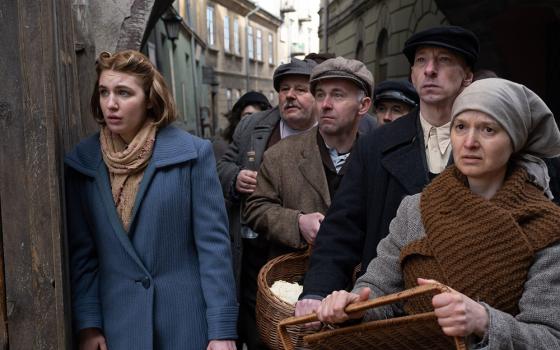I think most of us are kind of shocked and maybe confused when we hear Jesus say, "Do you think I have come to bring peace on earth?" We expect yes, but instead he says, "No, I tell you, but rather division." Then he shows how that division cuts through the human family at every level, right down into our immediate families where sometimes we feel the most severe division that brings great pain and hurt within a family.
How can that be? Jesus, born in Bethlehem, angels singing, "Peace on earth to those of good will," Jesus the Prince of Peace, and he says, "No, I came to bring division." What is happening is merely, at one sense, a matter of grammar. We think when Jesus says, "I came to bring division," that that was his intention. But what he’s doing is merely stating a fact. Ultimately, he does promise us peace, but that peace doesn’t come just as a gift falling from heaven. No, it’s a result of the reign of God.
|
Twentieth Sunday in Ordinary Time |
We perhaps should have been more alert to the idea that Jesus might bring division. Forty days after his birth he’s taken to the temple to be presented to God, Mary to be provided with the spiritual purifications that were part of the Jewish ritual, and Simeon, the old prophet, speaks to Mary and says, "The sword will divide your heart because this child of yours will be a sign of division." How does that happen?
I think if we go to the fourth chapter of Luke, which we read earlier, where Jesus comes back to his hometown of Nazareth and given the scroll to read, and he picks out a passage from the prophet Isaiah where he reads, "The Spirit of God is upon me. God sends me to proclaim Good News to the poor, to give the blind new sight, to heal the brokenhearted, to set the downtrodden free, and to proclaim God’s year of favor."
As he read that passage, proclaiming that the reign of God is going to happen and this is what it looks like: The poor are raised up, the blind are given new sight, the brokenhearted are healed, the downtrodden, the ones treated with injustice are set free, they’re lifted up, and everyone begins to live in the time of peace and fullness of life -- the reign of God. That’s what Jesus proclaimed and that’s what he came to do.
In fact, do you remember at the beginning of his public life, he invites his disciples after he announces, "The reign of God is at hand. Believe the Gospel and change your lives." Jesus is telling them and telling us that yes, this reign of God is about to break forth, but there has to be this extraordinary conversion, change where the poor are provided with all they need for the fullness of life, and those treated with injustice and oppression are set free. Does that happen without division? No.
If you want a really clear example of what this means when Jesus proclaims the reign of God and how the world has to be transformed to become that reign of God, you find it in an article written by a Jesuit priest who was murdered back in 1989 in El Salvador because he and his fellow members of the society teaching at the University of Central America in El Salvador were proclaiming the work of justice, teaching justice, teaching the need for change, transforming their society, which was a society filled with injustice.
Archbishop Romero would describe it, "So few have so much; so many have so little. The poor are oppressed, downtrodden." When the Jesuits began to teach the gospel of justice and to work for change, it brought about violence. In fact, Fr. Ellacuría, the rector of that university, in writing an article about the situation in which he was denouncing the condemnation of the Jesuits for promoting violence, he pointed out, "No, we don’t promote violence. We’re working against violence." But he says, "You have to understand where violence begins."
That’s what he calls "the violence of the structures." Built into laws, into customs, into the society in which we live there are structures that cause the poor to be poor, allow the rich to become rich and richer and richer. These structures of injustice have to be changed. That’s what Fr. Ellacuría said the Jesuits were teaching and trying to bring about in their tiny country of El Salvador. They were murdered because of what they were trying to do because those who had the system working in their favor would not give up easily.
That’s where we need the conversion. We need to bring about change in our structures so that what Jesus says about the poor, "Good news will happen for the poor and what about the downtrodden? They’ll be set free. The reign of God will begin to happen." But it only comes with the transformation of those sinful structures. Pope John Paul kept talking about that. Pope Francis talks about that now, how we have to change these structures that cause people to be poor, to be oppressed, to have a lack of healthcare, a lack of what you need for a human life -- water, food, clothing.
There’s extraordinary injustice in our world even within our country. When Jesus says, "I came to bring division," he means, "That’s because I have to preach this message of justice, of change, of making the society in which the community of disciples lives a just society, a society where everyone has an opportunity for the fullness of life." That’s what the reign of God means and that’s where peace will happen. Peace will happen and it is the gift of God as we enter into the work of Jesus to bring about change, to transform our world into as close an image of the reign of God as possible.
There are so many ways in which that needs to be done. Look at the people in Flint still suffering from that extraordinary injustice perpetrated against them, that prevented their having clean water. That’s still not really taken care of yet. But look at in our own city. There’s an article recently in the paper about downtown flourishing. Yes, and it’s true; new restaurants are opening up, lots of people are coming down, but it’s been within a very limited area. The neighborhoods are still overwhelmed with poverty, with a school system that is totally unjust to the kids who are sent to those schools.
There is much injustice, much violence being done against the poor and the oppressed. Much of that comes from the structures that we have established within our society. We have to begin to change. Now this week, both presidential candidates came to Detroit, each of them speaking about their economic plans, "If I’m elected president, this is what I intend to do." Those plans have been thoroughly analyzed by many economists, people who know how the system works, and they project what will happen as a result of each plan.
These aren’t predictions that will be fulfilled word for word, everything coming out just as the so-called "experts" say. Yet, the plans are different; they will have different outcomes. When we vote, won’t it be important for us to vote with some understanding of which candidate is proposing what kind of plan? I’m not telling you which one to vote for, but I am urging us to take the time to become informed, to hear what they say, to examine it because their plans are modeled on things that were done before, how they’ve worked in the past, so we might understand what will happen.
Because it is through the political process -- at least that’s one way in which we change structures on a larger scale, so we have to enter into this effort. But then it goes down further within our city, our neighborhoods, we have to try to bring about change, reach out to those who are homeless, those who are neglected, try to find some ways to bring them food and clothing and shelter. There are many programs going on that do this, and it’s up to us to try to work for the immediate relief, but also once more, to work on a more profound level to bring about change.
And just like Jesus, just like Jeremiah, when you proclaim the word of justice, urge for change, there can be division, and will be division. But that can be overcome if all of us enter into this in a prayerful way and we try to understand as adequately as we can, be engaged in conversations and efforts to become knowledgeable, we can overcome the divisions and perhaps build a society at every level that will be a society where justice begins to happen. Then it will be a society that will bring about peace, what Jesus really came to bring.
As he announces the reign of God, he proclaims that it means fullness of life and joy and peace for every person. It’s our work to enter into that. In our second lesson today, the author puts it in a very beautiful way, "Keep your eyes fixed on Jesus." He gave himself totally to this work of proclaiming God’s good news of giving his life to make it happen, of showing us that we have to work for the common good of all, reach out in love to all of our brothers and sisters in our immediate family, our neighborhoods, our communities, in our human family. That’s what Jesus did. Keep your eyes fixed on him as we move forward. Through following him there will be division, but ultimately, there will be peace and fullness of life.
[Homily given at St. Leo Parish, Detroit, Mich. The transcripts of Bishop Gumbleton's homilies are posted weekly to NCRonline.org. Sign up here to receive an email alert when the latest homily is posted.]








